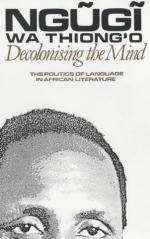
|
| Name: _________________________ | Period: ___________________ |
This test consists of 5 multiple choice questions, 5 short answer questions, and 10 short essay questions.
Multiple Choice Questions
1. In what book of the author's did he narrate the fate of the production of Maitũ Njugĩra?
(a) Petals of Blood.
(b) Barrel of a Pen.
(c) Homecoming.
(d) Penpoints, Gunpoints, and Dreams.
2. In Chapter 1, Part IV, the author states that "Language, any language, has a dual character: it is both a means of communication and" what (13)?
(a) "A product of necessity."
(b) "A carrier of history."
(c) "A carrier of culture."
(d) "A symbol of unity."
3. What does the author describe as the second aspect of language as culture in Chapter 1, Part IV?
(a) Language as a means for production.
(b) Language in the form of written signs.
(c) An image-forming agent in the mind of a child.
(d) Culture as a reflection of history.
4. What was the approximate population of Kamĩrĩĩthũ in 1975?
(a) 5,000.
(b) 20,000.
(c) 10,000.
(d) 15,000.
5. When did the production of Maitũ Njugĩra begin?
(a) September, 1976.
(b) November, 1981.
(c) July, 1982.
(d) March, 1977.
Short Answer Questions
1. Who wrote Contes d'Amadou Koumba?
2. Where did Dr. Kimanĩ Gecaũ flee to in 1982?
3. What statement largely sums up the author's central theme in Chapter 1, Part IV?
4. What was the first school that Ngũgĩ wa Thiong’o attended?
5. When was the Bata shoe factory established?
Short Essay Questions
1. What was Chinua Achebe's stance on language?
2. How does the author describe the significance of land in Kenya?
3. What are the main characters anticipating in the opening of Ngaahika Ndeenda?
4. What does the author describe as the effects of one's written language being separated from one's environmental language?
5. Describe the Ituĩka ceremony. What was its purpose and how often did it take place?
6. Who is David Diop and what was his perspective on language?
7. Who were the Mau Mau?
8. How does the author describe the peasant's relationship to language in Chapter 1, Part VII?
9. What are the three aspects of language as means of communication?
10. Describe the theater that was erected at the Kamĩrĩĩthũ Community Education and Cultural Centre. Where was it located?
|
This section contains 818 words (approx. 3 pages at 300 words per page) |

|




